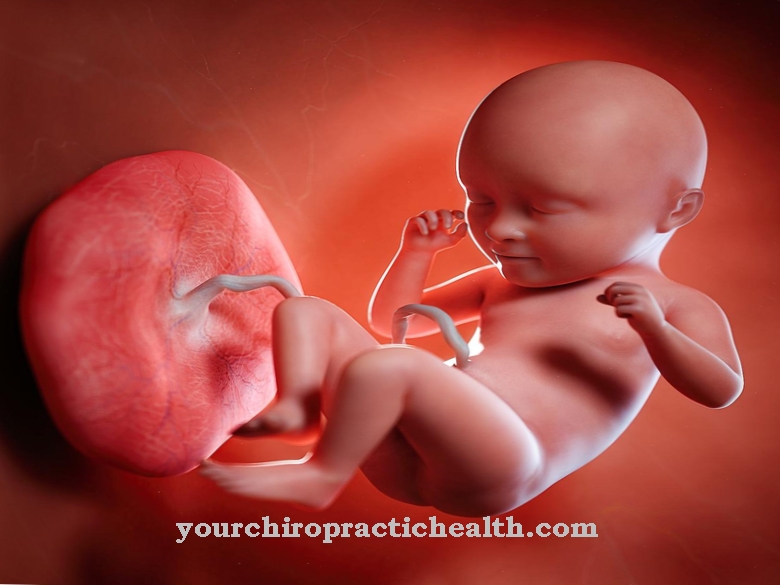The Refeeding syndrome (RFS) is a life-threatening condition that can occur when re-feeding after a long period of starvation. It is characterized by a disorder of mineral metabolism with the appearance of edema and heart failure. To prevent refeeding syndrome, food intake should be slow and gradual under medical supervision after a period of malnutrition.
What is refeeding syndrome?

© Foxy_A - stock.adobe.com
The syndrome was first observed after the end of the Second World War, when Japanese prisoners of war and inmates of National Socialist concentration camps suddenly developed severe symptoms of heart failure with edema after consuming normal amounts of food. Many deaths are due to the aftermath Refeeding syndrome traced back.
Today this condition often affects patients with anorexia nervosa after resuming diet. It was observed that parenteral nutrition (venous infusion of glucose) is particularly predestined for the development of a refeeding syndrome. Oral ingestion of food or artificial feeding via the intestines can also cause the symptoms.
As a rule, RFS leads to death if it is not recognized and treated in time. The first symptoms of refeeding syndrome usually show up within four days of starting normal feeding. The occurrence of the disease also depends on the degree of malnutrition and the length of the previous absence from food.
causes
The cause of the refeeding syndrome is to be found in the development of a complete imbalance of the mineral metabolism due to resumption of food after a prolonged period of hunger. After 48 hours of food abstinence, all of the carbohydrate stores in the body are used. The body is now increasingly starting to break down fats with the formation of ketone bodies.
The longer the hunger period lasts, the more valuable minerals and vitamins are lost in the body.If the body is supplied with larger amounts of glucose after such a period, the pancreas immediately begins to produce insulin in order to transport the glucose into the cells for energy production. However, burning the glucose requires some minerals and vitamins. Phosphate and vitamin B1 are particularly needed.
The phosphates are a prerequisite for glucose burning. The energy storage ATP is increasingly generated from them. Vitamin B1 catalyzes the breakdown of glucose. Therefore, the need for vitamin B1 increases at the same time. In addition to the increased absorption of phosphates, potassium and magnesium ions are also absorbed into the cell. The balance between the intracellular and extracellular concentrations of minerals is disturbed.
The minerals are needed in the cell for energy production, but the body already suffers from a mineral deficiency due to the long absence of food. The minerals coming from the extracellular space are now missing there. The imbalance makes the blood vessels permeable and develops severe edema. At the same time, the increasingly formed insulin holds back water in the body. Heart and kidney failure occur.
Symptoms, ailments & signs
The refeeding syndrome is characterized by water retention in the tissue (edema), heart failure and an acute deficiency of vitamin B1. Vitamin B1 deficiency induces metabolic acidosis, cardiac insufficiency and neurological failures. At the same time, the sodium concentration increases in the intercellular space. Confusion, low pulse and weak breathing occur. Eventually it comes to heart and kidney failure.
An important finding is hypophosphatemia. The cells lack phosphates to generate energy. The result of the phosphate deficiency is the dissolution of the striated muscle fibers (rhabdomyolysis), the dissolution of the red blood cells (hemolysis) and reduced breathing. Hypomagnesaemia simultaneously causes cardiac arrhythmias, ataxias, tremors and convulsions. After all, hypokalemia is the cause of cardiac arrest and respiratory arrest. Platelet and leukocyte disorders also occur.
Diagnosis & course of disease
Even before artificial feeding in anorexia nervosa, risk patients who could develop a refeeding syndrome should be identified. Not all re-fed patients develop RFS. The risk depends on the lack of minerals and vitamin B1. In addition, the condition of the internal organs also plays a major role. A well-trained team ensures that refeeding syndrome is recognized in good time.
Before refeeding, the hydration status should first be checked and normalized. Pulse and blood pressure also require close monitoring. A daily body weight control provides information on whether the increase is pathological (due to water retention) or physiological due to the improved nutritional status. During refeeding, constant monitoring to control potassium, magnesium, sodium and phosphate is necessary in order to be able to intervene. Kidney values, calcium, and plasma glucose should also be constantly monitored.
Complications
If there is a refeeding syndrome, this is in most cases associated with serious health complications. Cardiovascular complaints, which in the most severe cases lead to heart failure, are typical of the disease. Accompanying this is water retention in the tissue - edema develops and causes discomfort and pain. In addition, a vitamin B1 deficiency occurs, which can aggravate the heart failure and also leads to neurological failures and metabolic acidosis.
Due to the rapidly increasing sodium concentration in the cells, blood pressure drops and breathing flattens. As a result, disorders of consciousness occur before heart and kidney failure finally occur. In less severe cases, the consequences include cramps, ataxias and difficulty breathing. The individual symptoms can, depending on the patient's constitution, cause further complications. Intensive medical treatment is always required for refeeding syndrome.
This is also associated with risks. The active ingredient adrenaline, which is used in heart failure, can cause serious gastrointestinal complaints and permanently damage the kidneys and liver. In individual cases the heart is also attacked and heart failure develops. Finally, allergic reactions to the agents and materials used cannot be ruled out.
When should you go to the doctor?
The refeeding syndrome must definitely be treated by a doctor. This condition is a serious condition that requires immediate treatment. In the worst case, if left untreated, the affected person can die. Early treatment can prevent further complaints or complications.
See a doctor if the patient is very confused and has a markedly decreased pulse. The patients are often tired and cannot actively participate in everyday life. Breathing or the heart may stop. If these symptoms persist, a doctor must be consulted. If the patient loses consciousness or stops breathing, the emergency doctor should be called directly or the hospital should be visited. Tremors or cramps in the muscles can also indicate the refeeding syndrome. A general practitioner can be seen at the first signs of the syndrome. Usually the symptoms can be completely alleviated if early treatment is initiated.
Therapy & Treatment
To avoid refeeding syndrome, refeeding should always be carried out under medical supervision. Before starting refeeding, insufficient electrolytes and vitamins must first be substituted. This can be done orally, enterally or parenterally. High-dose vitamins and electrolytes should also be given for at least 10 days during re-feeding.
Vitamin B1 should be administered thirty minutes before resumption of nutrition, followed by 200 to 300 mg orally or intravenously for at least three days. The calorie intake depends on the weight and starts with 15-20 Kcal / kg / day. It will be increased gradually.
prevention
The measures described during refeeding can help prevent refeeding syndrome. It is important that the resumption of diet is only carried out under the supervision of a knowledgeable medical staff. After checking the mineral and vitamin status, any deficits must be compensated for before starting refeeding. Even during re-feeding, all values require constant monitoring.
Aftercare
Follow-up treatment for refeeding syndrome depends on the underlying condition and the symptoms in which refeeding syndrome was manifested. Particularly in patients with anorexia, it is important to avoid a renewed malnutrition, which is actually the underlying cause of the refeeding syndrome, because a renewed malnutrition can lead to the re-emergence of a refeeding syndrome. For this purpose, a balanced diet high in fat, protein and carbohydrates with a high calorie intake should be aimed for.
If malnutrition recurs, it is important to increase the calorie intake only slowly within the first ten days of treatment in order to avoid re-feeding of the refeeding syndrome. In addition, regular checks of all nutrient values in the blood should also be carried out after a refeeding syndrome, as people who have once had refeeding syndrome generally have an increased risk of intermittent malnutrition and the recurrence of refeeding syndrome.
If a deficiency is found, food supplements containing the appropriate nutrients should be given as a precaution even to patients of normal weight. If there is any uncertainty as to whether they will be taken, they may have to be administered via infusions. If the refeeding syndrome has led to edema (water retention), treatment with water tablets (furosemide) and, if necessary, surgical removal of the water retention may be necessary. If you are constipated, you may need to give laxatives to loosen the stool.
You can do that yourself
This condition usually affects people who have been malnourished or malnourished for a variety of reasons and then try to eat normally again. The syndrome can be fatal if it is not recognized in time and treated in intensive care. Usually the patient has a time window of only a few days.
The patient should be aware that a longer period of hunger has cost the body minerals and vitamins that it needs for the processing and digestion of the food that is now being supplied. In the absence of them, the various symptoms of refeeding syndrome such as edema, malaise and / or pain arise. Now at the latest, the patient must visit a doctor or a clinic, where his mineral and electrolyte balance can be closely monitored. Otherwise there is a risk of kidney and heart failure.
In general, refeeding syndrome affects people who are parenterally force-fed because of a known anorexia condition. But people who only force themselves to break the fast after weeks of voluntary fasting can be affected, as can people who have been malnourished for a long time due to war or natural disasters and now have unrestricted access to food again.
Once the risk of refeeding syndrome has been averted, a diet rich in minerals and vitamins is recommended in order to sustainably replenish the exhausted body stores.



.jpg)

.jpg)





















